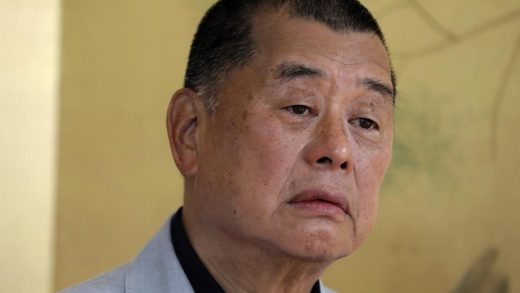:format(webp)/https://www.thestar.com/content/dam/thestar/entertainment/television/2023/02/14/waneek-horn-miller-brings-her-wealth-of-life-experience-to-canadas-ultimate-challenge/ultimate_challenge.jpg)
Waneek Horn-Miller knows what it means to be a competitor.
You could argue that she has been competing all her life.
That’s why it was an easy decision to say yes when she was approached to join five other elite Canadian athletes to mentor a team of everyday Canadians for a new CBC reality series. “Canada’s Ultimate Challenge,” promoted as “the country’s largest obstacle course,” premieres Thursday.
“I was absolutely honoured to be a part of the coaching staff,” Horn-Miller said in an interview.
“When you’re standing shoulder to shoulder with Super Bowl champions, Olympic gold medallists, one of the most decorated Olympians in Canadian history, a three-time Olympic speedskater … I mean I went to one Olympics and I came in fifth so I was like, ‘What am I doing here?’”
Horn-Miller is referring to the fact that her team of Canadians will be up against squads led by Super Bowl champ Luke Willson, two-time Olympic gold medallist Donovan Bailey, six-time Olympic medallist Clara Hughes, Olympic speedskater Gilmore Junio and Jen Kish, the former captain of Canada’s bronze medal-winning women’s rugby sevens team.
“I may not have an Olympic gold medal, but I have an incredible amount of experience in life that I can hopefully help my team with,” Horn-Miller said.
That experience cannot be understated. The former athlete and mother of three survived a near-fatal stab wound during the Oka Crisis in 1990 when she was just 14, during a standoff between Quebec police and armed forces and the Mohawk communities of Kanesatake and Kahnawake over plans to expand a golf course across land sacred to the Mohawks.
It was a moment captured forever by a photo that continues to appear in newspapers across the country.
Horn-Miller says it wasn’t the first or the last time she has stood up for Indigenous rights in Canada.
“There is a two-tier justice system for this country,” she said. “We took a stand against a golf course being built on top of our traditional burial ground and the Canadian government sent in more military to our two communities, which we did not step one foot off of.
“I think Oka is a good opportunity to flash back to an important battle that happened right here in Canada.”
Horn-Miller is remembered for another picture: a photo taken a decade after the Oka Crisis, snapped after she became the first Mohawk woman to compete at an Olympics when she qualified for the Sydney games in 2000. That’s when the co-captain of Canada’s water polo team posed naked for a Time magazine cover with only a strategically placed water polo ball. She says she posed because of her desire to change the way Indigenous people and, more specifically, Indigenous women were being presented.
“With residential schools and many intentional efforts to make us ashamed of ourselves and our bodies … to hate ourselves … this is your chance to help change that,” Horn-Miller said, crediting a conversation with her activist mother, Kahn-Tineta Horn, as being the deciding factor in agreeing to the photo shoot.
“She said, ‘Your body is powerful and strong and you have a chance to show a very different image of who we are, and the beautiful and powerful lineage that we come from.’ It also pertains to that hyper-sexualization of Indigenous women, that exoticness of women of colour. She didn’t want to leave any room for misinterpretation.”
Taking her mother’s advice to not smile for the photo despite the photographer’s best efforts to get her to, Horn-Miller said she is still proud of her decision to model as a determined woman instead of someone overtly sexualized. It also allowed her to stand up against being presented as a victim in the Oka photo.
“Having that (Oka) picture and having no control, and then getting a chance to do this photo, it was an opportunity to change a little bit of that for myself.”
It’s the same reason Horn-Miller decided to recreate the cover in 2019 with Indigenous photographer Nadya Kwandibens.
While working on a project about knowledge translation while pursuing her master’s degree in Indigenous studies and kinesiology at the University of British Columbia, Horn-Miller decided her own life presented the best case study.
“I was trying to portray an older, wiser and more battle-scarred woman. That’s kind of what I have been through in the last 22 years,” she said.
Horn-Miller hopes these battle scars will help propel her team through the various competitions on “Canada’s Ultimate Challenge.”
Of course, she couldn’t say whether her team will emerge victorious.
“We definitely win in the realm of a team that has some of the most incredible human beings on it,” she said.
“If I look at what I think winning is, there’s the Western concept of winning, which is the end goal and getting the big prize, but I tried to instill an Indigenous concept of winning, which was if you enter this challenge and if you give me absolutely everything within your spirit, in your body and in your mind, then no matter the outcome you have already won.
“That’s what my team showed me.”
JOIN THE CONVERSATION



